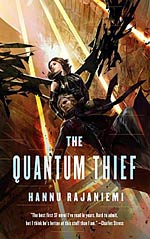
![]() Scott Laz
Scott Laz
12/26/2011
![]()
Finnish author Hannu Rajaniemi's The Quantum Thief is the most accomplished and interesting debut novel I've read since Paolo Bacigalupi's The Windup Girl. A mash-up of hard SF based on quantum physics and molecular, and early 20th century detective/crime fiction, with two of the main characters seemingly based on Arséne Lupin (French writer Maurice Leblanc's "gentleman thief" character) and Sherlock Holmes. The plot begins with a heist caper: Meili and her sentient spaceship Perhonen break thief Jean le Flambeur out of prison, in exchange for which they want him to help steal something...
That sounds simple enough, except that the prison is a Dilemma Prison of the Sobornost (a posthuman collective in control of much of the solar system), in which le Flambeur was sentenced to relive dangerous encounters with copies of himself and other prisoners, based on game theory, and leading to repeated deaths and rebirths. And part of the mission for Meili's mysterious employer involves le Flambeur retrieving his own lost memories from his time on Mars, when he lived in a city called Oubliette, which turns out to be a moving city engaged in a continuous terraforming operation, while battling a plague of "phoboi" left over from a war centuries before. And the mystery turns out to revolve around the nature of the Martian society, in which everyone is linked to a collective "exomemory," protecting individual privacy with complex "gevulot" protocols. By the end of the novel, the nature of the exomemory, and thus of the history of Martian society and the knowledge and memories of everyone on the planet, is in question, as the novel takes a turn into Philip K. Dick territory. (And that description leaves out the detective subplot, in which the third point-of-view character, Isidore Beautrelet, investigates consciousness-stealing "gogol pirates," in a case that ultimately pits him against le Flambeur.) So maybe it's not so simple after all! In fact, readers may feel lost during the first third of the novel, as they are bombarded with unfamiliar terms and concepts and try to come to grips with the nature of a posthuman society in a future solar system where technologies derived from quantum physics and molecular biology have blurred the distinctions between organisms and machines, natural and artificial intelligence, and even life and death. Rajaniemi immerses the reader in this world while avoiding "infodumps," so it takes a while to catch on to how things work (I'm reminded of Steven Erickson's Malazan fantasy series in this respect), but careful reading is rewarded as both setting and plot fall into place.
I especially liked the inventiveness of the concepts related to the Martian society and the nature of the Oubliette city. Each citizen carries a watch that tells her how much time she has left before she becomes"Quiet," which involves the death of the physical body and the uploading of her consciousness into any of a variety of engineered organisms engaged in terraforming or other physical tasks needed to maintain the moving city. After an extended period in this role, the Quiet can again return to society. In this society, time itself becomes a commodity (one especially wealthy citizen is referred to as a "milleniare"), and tourists must contend with time beggars. The novel is filled with equally fascinating SF ideas, and readers looking for old-fashioned "sense of wonder" science fiction, updated for the 21st century, are unlikely to be disappointed.
The Quantum Thief is apparently the first of a trilogy, and there are many directions in which a sequel might go, but the novel is self-contained and satisfying in itself. Rather than ending with a plot cliffhanger, Rajaniemi finishes the story by shedding a bit of light on what's happening further below the surface of the events seen in the novel, leaving the reader hungry for more background on the nature of this posthuman society, which consists of several factions (if that's the right term) whose underlying motivations are not yet entirely clear. I'm certainly looking forward to that next book, and to whatever Rajaniemi comes up with thereafter. Given the nature of his accomplishment in his very first novel, Hannu Rajaniemi is likely to be a figure to contend with in science fiction for some time to come.